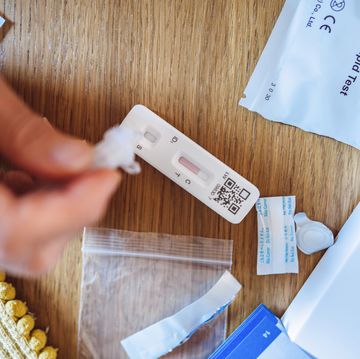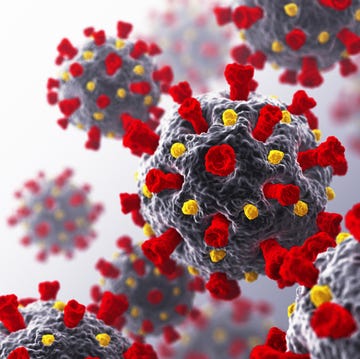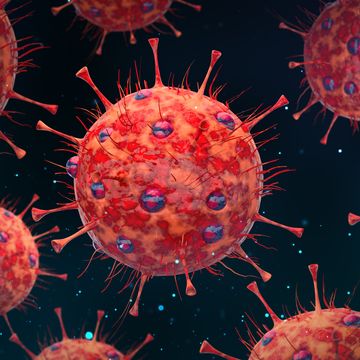Your immune system is your main line of defense against illness, so it only makes sense that you’d want to keep it in top shape. That’s especially true during cold and flu season—and with an outbreak of novel coronavirus (COVID-19) sweeping the country.
You’re born with your immune system and everyone’s is slightly different, but there are certain things you can do to try to bolster it, says Julia Blank, M.D., family medicine physician at Providence Saint John’s Health Center in Santa Monica, CA. “Maintaining a healthy immune system requires that you take good care of your body,” she says.
How does the immune system work, exactly?
Your immune system is actually made up of “multiple layers of defense,” Dr. Blank says. This includes physical barriers like your skin, cilia (tiny, hair-like structures) that line your airways, and specialized cells that recognize and attack foreign substances like viruses and bacteria, she explains.
“Some of these immune cells are nonspecific and destroy anything that appears foreign. Other cells produce antibodies that recognize and target protein markers (called antigens) on the surface of germs,” Dr. Blank says.
Your immune system also has the ability to recognize pathogens you’ve come into contact with before and mount a quick response. “This is why we don’t usually get sick after being exposed to a germ we’ve already encountered and fought off in the past,” Dr. Blank says.
How to boost your immune system
There are a few science-backed approaches you can take to boost your immune system, most of which are recommended for overall wellness:
1. Keep your alcohol intake in check.
“High alcohol intake has been shown to suppress immune function,” says Jessica Cording, M.S., R.D., author of The Little Book of Game-Changers. Plus, booze “can be dehydrating, and hydration is really important for protecting yourself from illness.” When you’re dehydrated, your cells aren’t able to function at their optimal level—and that can open up the door for you to get sick, Cording explains.
If you don’t want to cut out booze completely, sip in moderation. That means having up to one drink a day for women and two drinks a day for men, according to the U.S. Dietary Guidelines for Americans.
2. Reduce your stress levels.
Stress seems harmless enough once you get over whatever it is you’re anxious about, but studies show it can “compromise or suppress the immune system and make us more vulnerable to infection,” Dr. Blank says.
Specifically, research has found that stress causes a release of the hormone cortisol, which can boost inflammation, a precursor to many diseases, in your body. Chronic stress may also interfere with the infection-fighting ability of your white blood cells, making you more susceptible to contracting illnesses. (Can’t unwind? Check out these science-backed ways to relieve stress.)
3. Eat plenty of fruits and vegetables.
Putting a rainbow of fruits and vegetables on your plate can do your immune system a solid, says Beth Warren, R.D., founder of Beth Warren Nutrition and author of Secrets of a Kosher Girl. “Fruits and veggies help arm your body with antioxidants it needs to fight oxidative stress, which includes contracting a sickness, in your body,” she says.
Not sure how much you need? The U.S. Dietary Guidelines for Americans recommends that people who eat 2,000 calories a day have 2 cups of fruit and 2.5 cups of vegetables a day. Some solid options: leafy greens, bell peppers, citrus fruits, sweet potatoes, and berries.
4. Load up on vitamin D.
Vitamin D plays an important role in supporting the immune system by helping your body produce antibodies, which can then fight illness, Cording says.
“Active vitamin D gets sent to different areas of your body, including your bones, intestines, colon, brain, and immune cells, where it binds with the receptors on these cells and ultimately turns them on,” adds Warren.
The kicker: Most people don’t get enough of it. Your body primarily produces vitamin D from the sun’s UV rays (it’s called the sunshine vitamin for a reason!), but you can also load up on vitamin-D rich foods to boost your intake, including fatty fish and seafood, mushrooms, eggs (don’t skip the yolk), and fortified foods, Cording says. If you suspect your vitamin D intake is low and would like to take a supplement, be sure to talk to your doctor. He or she can do a blood test to determine the appropriate dosage for you.
5. Prioritize sleep.
Spending more time snoozing is key, Dr. Blank confirms. “Getting enough sleep helps our bodies recover from everyday stress—both physical and mental—and promotes better functioning of our immune system,” she says.
When you don’t get enough shut-eye, your body may decrease the production of protective proteins called cytokines, which your immune response needs more of when it’s dealing with an infection or inflammation while under stress.
So just how much sleep are we talking about? The National Sleep Foundation says adults up to age 64 should snooze between seven and nine hours per night for, while adults 65 and up should aim between seven and eight hours. (Tossing and turning? Check out our full guide on how to sleep better every night.)
6. Wash your hands often.
Washing your hands regularly will help keep viruses and bacteria away from your eyes, nose, and mouth, which can do your immune system a solid, Dr. Blank says. “This reduces the variety and number of germs we are exposed to and keeps our immune system from getting overwhelmed,” she explains.
The Centers for Disease Control and Prevention (CDC) specifically recommends washing your hands with soap and water for at least 20 seconds, or the amount of time it takes to hum the “Happy Birthday” song from beginning to end twice.
7. Keep up with a regular exercise routine.
Being physically active can help keep pathogens out of your lungs and airways, according to the National Library of Medicine, which can minimize your odds of getting a cold, the flu, or other illnesses. Exercise can also give antibodies and white blood cells a boost, causing them to circulate more widely throughout your body, where they might detect illnesses better than they would if you didn’t get moving.
8. Finally, quit smoking if you haven’t already.
You already know smoking is bad for your health in so many ways, but it can also wreak havoc and “cause direct damage” to parts of your immune system, Dr. Blank says.
For example, smoking immobilizes cilia, the hair-like structures in your airways that help “sweep” out bacteria. “These cilia form the first line of defense against respiratory infections,” Dr. Blank says. When they’re immobilized, germs have “much easier access” to your lungs, she explains. Cue the coughing and sneezing.
Bottom line: Adopting certain lifestyle habits can strengthen your immune system.
Of course, you can do everything right and still get sick. But doing your best to boost your immune system now means your body will be that much more prepared for tackling whatever bugs may come your way later.
Like what you just read? You’ll love our magazine! Go here to subscribe. Don’t miss a thing by downloading Apple News here and following Prevention. Oh, and we’re on Instagram too.
















